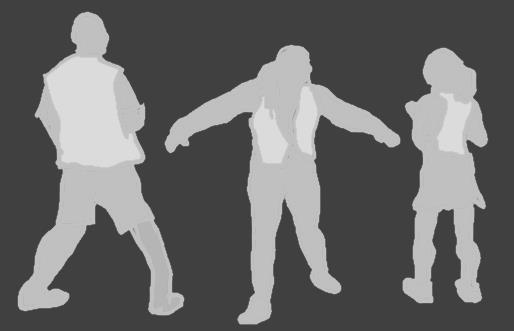Protest Marshals

Marshals are the people at protests wearing high-vis vests and doing things like blocking traffic and dealing with agitators.
There is a lot of misunderstanding about marshals; so, let's talk about marshals.
What do Marshals Do?
Marshals assist organizers in safely and effectively executing an action
Specific tasks marshals do:
- Block and direct traffic
- Direct a march, and provide information to protesters
- Watch for and communicate threats
- Deescalate agitators
- Try to maintain separation between protesters and police or agitators
- Deal with issues that come up during protests
- Limit routes for adversaries to attack a protest
Marshals are not security guards. Marshals are not, and should not be, “protest police” telling people how to protest.
But marshals do work for the organizers to execute a specific vision for a protest. If a protest is “family friendly” and a person's actions put other people at excessive risk; organizers may ask marshals to ask the individual to change tactics or do it somewhere else.
If you don't like how an organization runs its protests, talk to them about it or don't go to their protests, but marshals communicating organizers’ wishes doesn't mean marshals are "acting like cops”.
In the hundreds of actions I have participated in, 99% of them were or would have been safer and more successful with marshals.
The exceptions are less conventional actions. Black bloc often has no room or need for marshals. There can be issues with huge events without central leadership because it is not clear who the marshals answer to.
Marshals are generally provided by the orgs throwing an action, and an org’s marshals usually have some of the character of the org. A large Democratic non-profit will usually have more restrictive and cautious marshals than an org that is made up of scrappy leftists.
How Marshals Help
Leadership at a protest is busy. They need skilled people to deal with issues for them and to watch for problems.
Deescalation is key. Without people dedicated to dealing with agitators, far more protests would break down into shouting matches and fist fights - chasing away supporters and leading to increased police intervention.
Having people block traffic for a march obviously makes the march go smoother and dramatically reduces the risk of protesters being hurt by cars. Marshals keep a march moving, and a stalled march is a march at risk.
Marshals quickly communicate needs to the protesters. Need to let an ambulance through? Is it time to get out of the street and close up? Do we need to get the march away from aggressive police? Marshals make it happen.
Marshals are the eyes and ears of a protest. Marshals will report problems on the march route, potential threats, signs of police response, and when someone needs a medic.
In general, having easily recognized folks to give information and directions avoids confusion and panic.
Problems with Marshals
There are some common issues with marshals. The problems need to be addressed by the orgs involved, but none of this invalidates the good that marshals provide:
- Adventurism: some marshals are there for the thrill first, not the safety and success of the action.
- Control: some marshals have control issues and are too interested in telling people what to do.
- Aggression: some marshals do not deescalate, or they fail to step away when they themselves are escalated.
- Whiteness: marshaling is very white, and some marshals fail to respect the negative impact they can have in a space dedicated to non-white people.\
These are issues that need to be dealt with in training and by leadership. If groups refuse to deal with ongoing marshal issues, they should not be trusted. But most groups do. It just sometimes takes an episode with a marshal to realize they need training or should not marshal.
Marshals are almost always volunteers, and many are inexperienced. Marshaling is a learn-on-the-job thing. So, marshals will make decisions you or I disagree with. It is usually not nefarious or impactful. It is usually addressed by leadership.
And usually, the people yelling the loudest about flawed marshaling don't know shit about running a protest.
Marshals are not Cops
There are some folks spreading some bullshit that “marshals are literally cops”. They are saying things like “marshals work for the DOJ to undermine dissent”. Among reactionaries, the term “protest police” has been popularized.
First off, don't cop-jacket. It's dangerous and makes you look like a huge piece of shit who yourself cannot be trusted.
But also, this is utterly clueless. Marshals aren't some homogenous group. They are trained and fielded by thousands of orgs with different tactics and politics. To infiltrate every marshal group with DOJ employees would be the largest suppression operation in the history of the country. And somehow none of the people from revolutionary groups with marshal teams would notice these reactionary infiltrators?
There are DOJ documents and trainings for marshals, and these are examples of the DOJ trying to subvert and discredit organized protests. It doesn’t mean that the people organizing and marshaling protests work for the DOJ.
Much of these issues come from people ignoring the St Paul Principles and thinking they can take over or interfere with other people's protests. If leadership feels someone is putting a protest at risk or undermining the message of a protest, marshals are the folks who will communicate that. The marshals should do that respectfully. But instigators should respect organizers’ requests. Folks are blaming marshals when the issue is their own shitty, disrespectful behavior. I've said it a thousand times: “if you don't like how a group organizes, go organize your own protest”.
Community
An additional goal of marshaling is to protect, uplift, and connect community. Experienced marshals do the work because they want to support the fight against oppression and raise the voices of the oppressed. Most long-term marshals are interested in how well executed protests provide an entry point for new activists and a chance to educate people. Good marshaling is part of movement building - getting more people engaged in the fight for justice.
What about when an organizer doesn’t respect the community? The short answer is, marshals will stop working for organizers that are doing harm. If it seems to be an honest mistake, marshal leadership will address the organizers.
There are also different sorts of actions. An action may be planned as civil disobedience with the intention that some people will - with consent, support, and training - be arrested. An action may erupt into more of a revolt because the crowd is fed up. Or an action may be sloppy and unnecessarily risky due simply to poor planning. The first two examples are not against community, but the last is.
Other Types of Marshals
Besides foot marshals described above, there are additional types of marshals:
- Motorcycle marshals move ahead of the march and take intersections / block traffic
- Bicycle marshals may function similarly as motorcycle marshals are may act as runners for communication within a march
- Car marshals form barriers at the front and rear of marches to help prevent vehicle attacks.
How to Help
If you attend a protest that doesn't seem to be well run, leave and don't attend other events by the organizers. Or maybe ask organizers about their mentions after the event is over - often there are reasons for decisions you may dislike.
Listen to leadership and marshals during a protest. There are many times that stalling or misdirecting a crowd can get people hurt or arrested. You don’t know what you don’t know about plans, intentions, risks, and commitments to the community surrounding an action. It doesn't matter if you call yourself a leftist, if you interfere with other leftists’ actions, you are doing the work of a reactionary.
If you'd like to marshal, a lot of orgs offer marshal training or will buddy new folks up with existing marshals at a protest. Orgs are usually looking for help.
